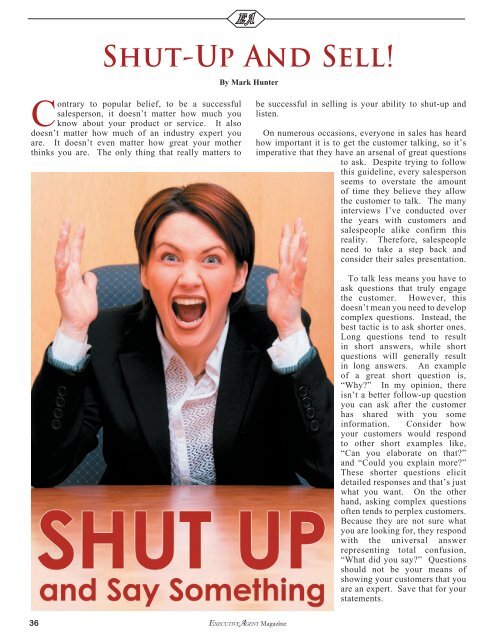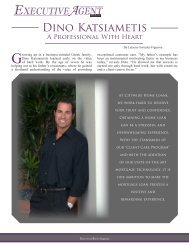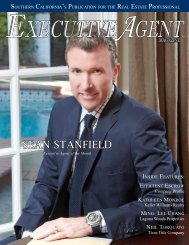Download PDF - Executive Agent Magazine
Download PDF - Executive Agent Magazine
Download PDF - Executive Agent Magazine
You also want an ePaper? Increase the reach of your titles
YUMPU automatically turns print PDFs into web optimized ePapers that Google loves.
E A<br />
Shut-Up And Sell!<br />
By Mark Hunter<br />
Contrary to popular belief, to be a successful<br />
salesperson, it doesn’t matter how much you<br />
know about your product or service. It also<br />
doesn’t matter how much of an industry expert you<br />
are. It doesn’t even matter how great your mother<br />
thinks you are. The only thing that really matters to<br />
be successful in selling is your ability to shut-up and<br />
listen.<br />
On numerous occasions, everyone in sales has heard<br />
how important it is to get the customer talking, so it’s<br />
imperative that they have an arsenal of great questions<br />
to ask. Despite trying to follow<br />
this guideline, every salesperson<br />
seems to overstate the amount<br />
of time they believe they allow<br />
the customer to talk. The many<br />
interviews I’ve conducted over<br />
the years with customers and<br />
salespeople alike confirm this<br />
reality. Therefore, salespeople<br />
need to take a step back and<br />
consider their sales presentation.<br />
To talk less means you have to<br />
ask questions that truly engage<br />
the customer. However, this<br />
doesn’t mean you need to develop<br />
complex questions. Instead, the<br />
best tactic is to ask shorter ones.<br />
Long questions tend to result<br />
in short answers, while short<br />
questions will generally result<br />
in long answers. An example<br />
of a great short question is,<br />
“Why” In my opinion, there<br />
isn’t a better follow-up question<br />
you can ask after the customer<br />
has shared with you some<br />
information. Consider how<br />
your customers would respond<br />
to other short examples like,<br />
“Can you elaborate on that”<br />
and “Could you explain more”<br />
These shorter questions elicit<br />
detailed responses and that’s just<br />
what you want. On the other<br />
hand, asking complex questions<br />
often tends to perplex customers.<br />
Because they are not sure what<br />
you are looking for, they respond<br />
with the universal answer<br />
representing total confusion,<br />
“What did you say” Questions<br />
should not be your means of<br />
showing your customers that you<br />
are an expert. Save that for your<br />
statements.<br />
36<br />
<strong>Executive</strong><strong>Agent</strong> <strong>Magazine</strong>

















